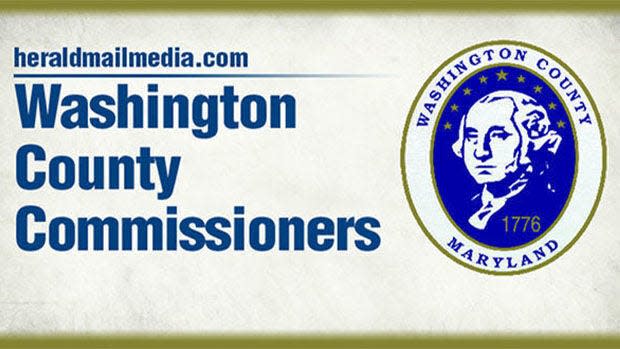Commissioners add to Rural Legacy land preservation, approve a 'rural business' zone

The county's agricultural character was front and center during Tuesday's meeting of the Washington County Board of Commissioners, as they discussed land preservation efforts, mainly in the southern portion of the county, and approved a request for a zoning overlay near its northern border.
They approved a request from Rural Preservation Administrator Chris Boggs to apply for $7.6 million in grants from the Maryland Department of Natural Resources for the Rural Legacy Program for Fiscal Year 2025, which begins July 1.
Maryland’s Rural Legacy Program provides funding to preserve large, contiguous tracts of land, protecting them from development. Washington County's Rural Legacy Area is concentrated near the Antietam National Battlefield. Boggs told the commissioners that money from this program has been used to preserve more than 8,700 acres thus far.
For the current fiscal year, the county received more than $3 million through the program, Boggs said. His application for the coming year is based on the estimated cost for easements his office is pursuing on 10 more properties.
The commissioners also approved the purchase of an easement through the Rural Legacy Program on a 67-acre property on Trego Road in Keedysville. The property, owned by Brent L. Clipp, borders the Weverton-Roxbury Rail Trail, Boggs said, and is near several other sites included in the Maryland Inventory of Historic Places.
The easement is being purchased for $291,676 from the funds allocated for Rural Legacy in the current fiscal year.
Commissioner Randy Wagner reiterated that the county preserves "a lot of land," although he said county officials often are criticized for warehouses constructed on property formerly occupied by farms.
"I think it's important that we continue with that message to the folks of Washington County because we always hear we're burning farmland, we're destroying farmland," Wagner said, "and it's ironic" the number of times Boggs has presented preservation requests the commissioners approved.
Planning director hopes to have new comprehensive plan before commissioners this spring
What kinds of businesses support an agricultural community?
The commissioners also approved a request for a "rural business floating zone" for a 2-acre property on Reidtown Road, just west of Marsh Pike near the county's border with Pennsylvania. But the approval came with conditions.
Ralph and Leah Martin, who live on the property, sought the floating zone to operate a small auto body repair shop on the property. Senior Planner Travis Allen told the commissioners that the county's planning commission had recommended approval, although the commission had received three written comments opposing the designation, and one in favor of it.
Allen said the concerns of those opposing the business centered on the adequacy of the road to handle business traffic, the effect having the business there would have on the neighborhood, the design of the business and its compatibility with the rural nature of the neighborhood, and its potential impact on groundwater resources.
The property is near, but not in, the Lehman's Mill Historic District.
Allen said the proposal would still need to go through site planning and reviews, and that most of those concerns could be addressed during that process.
A rural business floating zone is designed to permit businesses that "support the agricultural industry and farming community, serve the needs of the rural residential population, provide for recreation and tourism opportunities, and to establish locations for businesses and facilities not otherwise permitted in rural areas," according to the county planning department.
Commissioner Derek Harvey was concerned that the business didn't meet those criteria, although Allen said the planning staff had concluded it does.
"How does an auto body shop support the farming community?" he asked.
Harvey said there were more than 20 body shops within 10 miles of the property.
Attorney Noel Manalo, representing the Martins, told the commissioners that the property owners are members of the agricultural community but are trying to supplement their income by opening the body shop.
"When we say serving the agricultural community, I mean, certainly with a young family and trying to supplement income, you know that farming in and of itself isn't going to necessarily be as profitable as it once was," Manalo said.
Ralph Martin has "a knack" for auto body repair, and would be servicing customers from the farming community, he added.
"Vehicles are certainly part and parcel of what anyone in the agricultural community is going to be getting around in from one place to another," he said, "so certainly, they would be looking for folks that they trust to work on their vehicles as well … just because it doesn't have to do with grain feed, silos, livestock doesn't necessarily mean that it's not ag-related or serving the ag community.
"By virtue of someone that is part of that community providing services to other folks in that community, we are meeting that policy justification."
In the end, the commissioners agreed to approve the floating zone with the conditions that the Martins provide a buffer along the roadside, have no more than five customers' vehicles parked on the property at any time and that the property would not be subdivided to separate the business from the Martins' residence.
Commissioner Wayne Keefer was absent Tuesday and did not vote. Harvey said he would go along with it because Martin planned to meet the conditions, but said he was still "dismayed" that the county was stretching the criteria for the floating zone.
Washington County exploring ways to help owners afford renovation of historic properties
This article originally appeared on The Herald-Mail: Commissioners approve rural legacy easement, floating business zone
